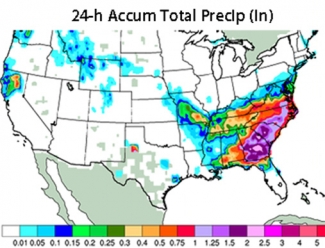The DTC provides a common framework for researchers to demonstrate the merits of new developments through the Mesoscale Model Evaluation Testbed (MMET).
Established in the Fall of 2012, MMET provides initialization and observation data sets for several case studies and week-long extended periods that can be used by the entire numerical weather prediction (NWP) community for testing and evaluation. The MMET data sets also include baseline results generated by the DTC for select operational configurations.
To date, MMET includes nine cases that are of interest for the National Centers for Environmental Prediction/ Environmental Modeling Center (NCEP/EMC). A brief description of each case, along with access to the full data sets is available at http:// www.dtcenter.org/eval/mmet. Researchers are encouraged to run several case studies spanning multiple weather regimes to illustrate the versatility of this new innovation for operational use.
One particular case available in MMET is 28 February 2009, when nearly 7 inches of snow fell in Memphis, TN. A squall line marched through the Southeast along the leading edge of a cold front, prompting three tornado and several high-wind reports. The next two days (1-2 March), snow fell from Atlanta to New York, dropping up to a foot of snow in some areas. The figure above shows the two day precipitation accumulation. This case is of interest to NCEP/ EMC because the North American Mesoscale (NAM) model quantitative precipitation forecast valid 1 March shifted precipitation too far north, missing a rain/snow mix in Georgia and falsely predicting snow in western parts of the Carolinas.
If improved forecast accuracy is demonstrated through objective verification results with MMET cases, the technique can be submitted for further extensive testing by the DTC.
Community users can nominate innovations for more extensive DTC testing by filling out the nomination form (http://www.dtcenter.org/eval/ mmet/candidates/form_submission. php).
As MMET continues to mature, additional cases will be made available to broaden the variety of available events in the collection. Submissions for additional cases to be included in MMET are accepted at: http://www. dtcenter.org/eval/mmet/cases/form_ submission.php. For more information on the testing protocol process defined to accelerate the transition of mesoscale modeling techniques from research to operations, please see http://www.dtcenter.org/eval/mmet/ testing_protocol.pdf.
Comments and questions regarding MMET or any stage of the testing protocol process can be directed to Jamie Wolff (jwoff@ucar.edu).
